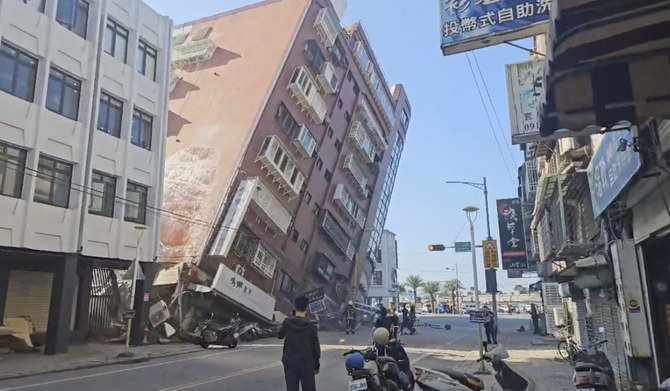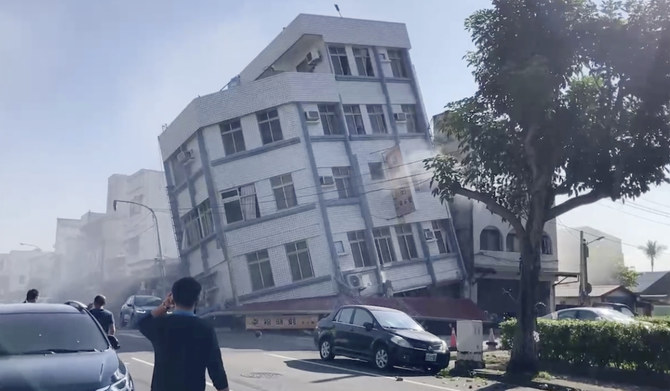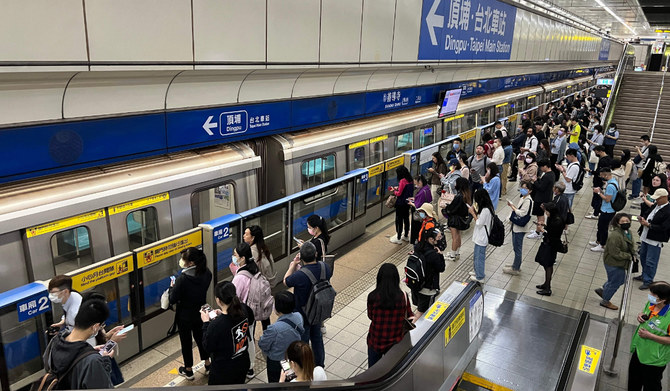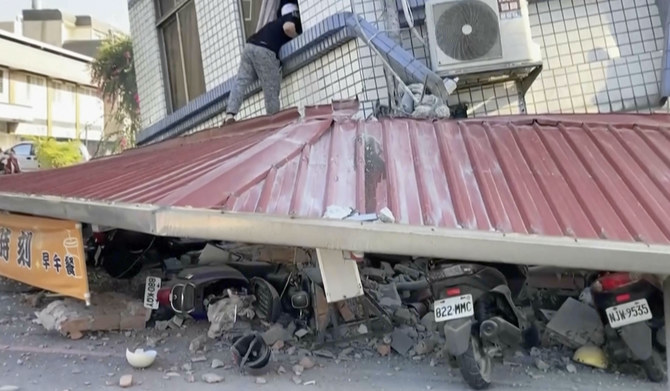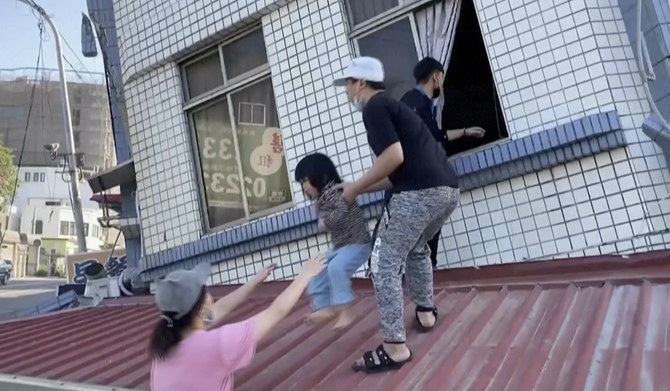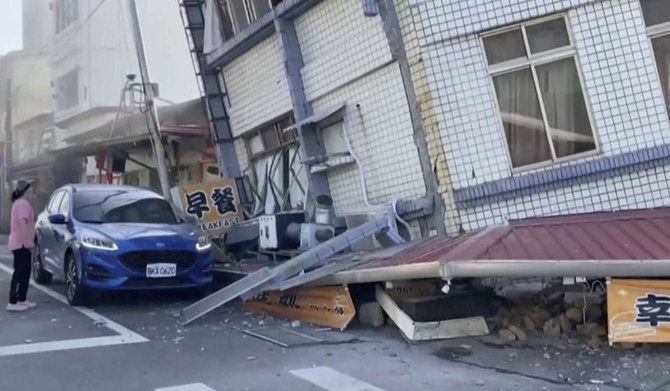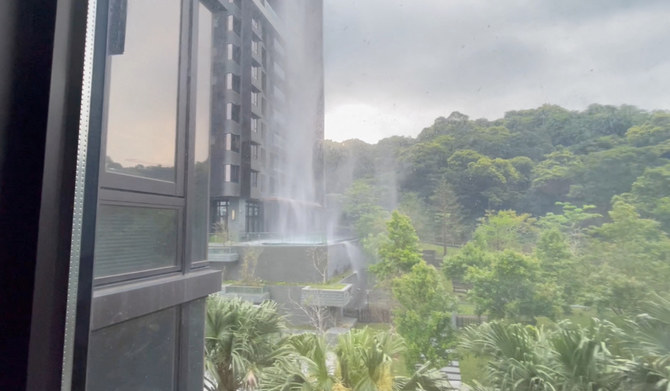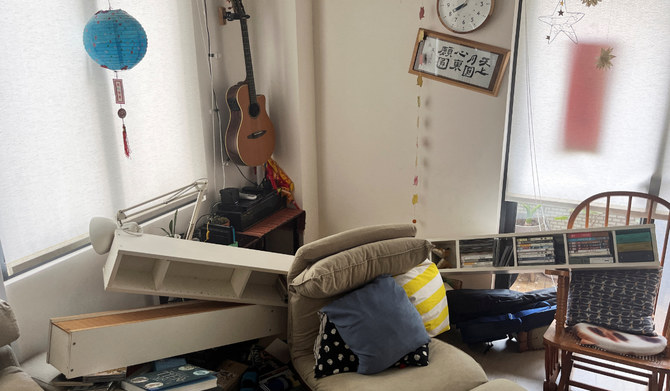HUALIEN, Taiwan: Taiwan’s biggest earthquake in at least 25 years killed nine people on Wednesday and injured more than 900, while 50 workers traveling in minibuses to a hotel in a national park were missing.
Some buildings tilted at precarious angles in the mountainous, sparsely populated county of Hualien, near the epicenter of the 7.2 magnitude quake, which struck just offshore at about 8 a. m. (0000 GMT) and triggered massive landslides.
Linda Chen, 48, said her apartment in downtown Hualien city had been so badly damaged in an earlier earthquake in 2018 that they had to move house. But her new apartment block was damaged too in the latest earthquake.
“We worry the house could collapse anytime. We thought we had already experienced it once in Hualien and it would not hit us again, because God has to be fair,” she said.
“We are frightened. We are so nervous.”
The city’s mayor, Hsu Chen-Wei, said all residents and businesses in buildings that were in a dangerous state had been evacuated. Demolition work was beginning on four buildings, the mayor said. The power of the quake was captured live as news anchors delivered their bulletins, steadying themselves against giant screens as their sets swayed and lighting rigs rocked back and forth overhead. The earthquake hit at a depth of 15.5 km (9.6 miles), as people were headed for work and school, setting off a tsunami warning for southern Japan and the Philippines that was later lifted.
Video showed rescuers using ladders to help trapped people out of windows. Strong tremors in Taipei forced the subway system to close briefly, although most lines resumed service.
Fire authorities said they had already evacuated some 70 people trapped in tunnels near Hualien city, including two Germans.
But they had lost contact with 50 workers aboard four minibuses heading to a hotel in a national park, Taroko Gorge, they said, and rescuers were looking for them. Another 80 people are trapped in a mining area, though it was not immediately clear if they were inside a mine. On a highway through the mountains, huge boulders from a landslide were strewn across the road. The Fire Bureau of Taichung City Government said it rescued a man in his 50s who was unconscious in a truck.
FIGHTER JETS
A woman who runs bed-and-breakfast accommodation in Hualien city said she scrambled to calm her guests who were scared by the quake.
“This is the biggest earthquake I have ever experienced,” said the woman, who asked to be identified only by her family name, Chan.
The government put the number of injured at 946.
“At present the most important thing, the top priority, is to rescue people,” said President-elect Lai Ching-te, speaking outside one of the collapsed buildings in Hualien.
The rail link to the area was expected to re-open on Thursday, Lai, who is set to take office next month, told reporters.
The White House said the US stood ready to provide any assistance necessary.
Taiwan’s air force said six F-16 fighter jets had been slightly damaged at a major base in the city from which jets are often scrambled to see off incursions by China’s air force, but the aircraft are expected to return to service very soon.
In Japan, the weather agency put the quake’s magnitude at 7.7, saying several small tsunami waves reached parts of the southern prefecture of Okinawa, while downgrading its tsunami warning to an advisory.
In the Philippines, seismology officials warned coastal residents in several provinces to move to higher ground.
Chinese state media said the quake was felt in the southeastern province of Fujian, while a Reuters witness said it was also felt in the commercial hub of Shanghai.
CHIP SUPPLIES
Aftershocks could still be felt in Taipei, with more than 50 recorded, weather officials said.
Most power has been restored after the quake, electricity utility Taipower said, with the island’s two nuclear power stations unaffected.
Taiwan’s high-speed rail operator said no damage or injuries were reported on its trains, although services would be delayed as it made inspections.
A major supplier of chips to Apple and Nvidia , Taiwan Semiconductor Manufacturing Co, said it had evacuated some fabrication plants and safety systems were operating normally.
It said later its workers were safe and had returned to their workplaces shortly after the earthquake. It said impacted facilities were expected to resume production during the night.
TSMC’s Taipei-listed shares ended down 1.3 percent, but the benchmark index largely brushed off the quake’s impact to close down 0.6 percent.
The official central news agency said the quake was the biggest since one of magnitude 7.6 in 1999 that killed about 2,400 people and damaged or destroyed 50,000 buildings.
Taiwan weather officials ranked Wednesday’s quake in Hualien as “Upper 6,” or the second-highest level of intensity on a scale ranging from 1 to 7.
Such quakes collapse walls unless they are made of reinforced concrete blocks, while people cannot stand upright and must crawl in order to move, experts say.


